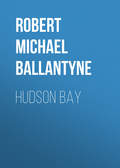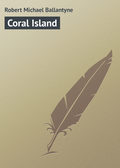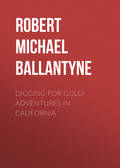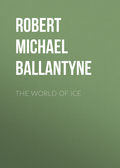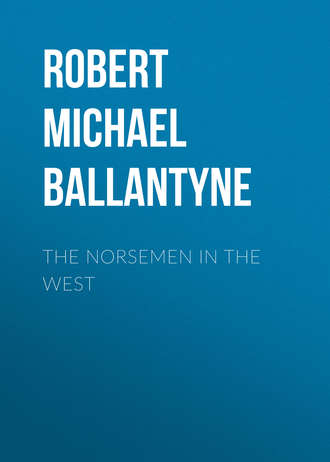
Robert Michael Ballantyne
The Norsemen in the West
Chapter Twelve.
Sage Converse Between Hake And Bertha—Biarne Is Outwitted—A Monster is Slain, and Savages Appear on the Scene
Not long after this an event occurred which produced great excitement in the new settlement; namely, the appearance of natives in the woods. It occurred under the following circumstances.
One morning Karlsefin gave orders for one of the exploring parties to be got ready to go out immediately. Karlsefin’s plan from the beginning had been to class his men in two divisions. One half stayed at home to work, the other half searched the land,—always taking care, however, not to travel so far but that they could return home in the evening. They were careful also not to wander far from each other. Sometimes Karlsefin went with the exploring party, at other times stayed at home to superintend the work there, while Biarne or Thorward filled his place. On the occasion in question Biarne was in charge.
Soon after the party had started, Hake, who was one of them, observed a female figure disappear round a copse near the shores of the lake. At that part they were about to strike off into the thick woods, so Hake went up to Biarne and asked leave to go along by the borders of the lake, saying that he could overtake the party again before they had reached the Willow Glen, a well-known rendezvous of the hunters and explorers of the colony.
“Go as thou wilt, Hake,” replied Biarne; “only see to it that ye overtake us before noon, as I intend to go on a totally new path to-day.”
The youth left with a light step, and, on overtaking the female, found, as he had expected, that it was Bertha.
“You wander far from home to-day,” he said, with a deferential salutation, for Hake’s bondage had not robbed him of his breeding.
“I love to wander,” answered Bertha, blushing.
Poor Bertha, she could not help blushing. It was her unfortunate nature to do so. When her feelings were touched—ever so little—she blushed, and then she blushed because she had blushed, and blushed again to think herself so silly!
“I fear it may be somewhat dangerous to wander far,” said Hake, stopping, for Bertha had stopped and seated herself on the stump of a fallen tree.
“Dangerous! Why so?”
“Why, because Skraelingers may find us out any day, and if they should come upon you unawares so far from home they might carry you off, and no one would be aware that you were gone until too late to pursue.”
“I never thought of that,” returned Bertha, with a slightly troubled look. “Well, I shall be more careful in future. But how come you to be wandering here alone, Hake? did I not hear your name called this morning among those appointed to go forth and search out what is good and beautiful and useful in the land?”
“Most true, Bertha, and I have gone forth, and not gone far, and yet have found something both good and beautiful and useful in the land.”
“And pray what may that be?” asked the maiden, with a look of surprise.
Hake did not answer, but the expression of his eyes was more eloquent than speech.
“Nay, then,” said Bertha, looking hastily away, and again blushing—as a matter of course! “I am no reader of riddles; and I hate riddles—they perplex me so. Besides, I never could find them out. But, Hake, has your party gone yet?”
“Yes, some time ago.”
“And are you left behind?”
“No, I have leave to go by the margin of the lake.”
“Then if you put off time talking with me you will not find it easy to overtake them; but I forgot: I suppose you count it an easy matter to overtake ordinary men?”
“I shall not find it difficult,” replied the youth briefly; and then, perceiving that Bertha felt uneasy—apparently at the tenor of the conversation—he quietly changed it by remarking that he preferred to walk by the lake for several reasons, one of which was that it reminded him of Scotland.
“Ah, you profess to love Scotland very much,” said Bertha archly, “but your brother evidently loves it more than you do.”
“With good reason, too,” replied Hake, “for it has given him a bride, and it had no such favours for me.”
“Indeed! what is her name?” asked the maiden, with much interest.
“Emma.”
“Poor Emma,” sighed Bertha; “but I hope that Heika will be freed one day and return to his native land to wed Emma. Perchance by that time Scotland may smile upon you too, and give you cause to love it better.”
“I love it well already,” said Hake, with enthusiasm, “yet am I content to stay here.”
“For shame, Hake! you do not deserve to be a Scot if you mean what you say.”
“I mean what I say, yet do I deserve to be a Scot.”
“Come, tell me, then, what this Scotland of yours is like. I suppose you deem it more beautiful than Iceland?”
The youth smiled. “It is not more wonderful than Iceland. I can say that with truth—but it is passing fair to look upon. It is a land of mountain and flood, of heath-clad braes and grassy knowes. Its mountain peaks rise bare and rugged to the skies, where lordly eagles soar. Its brawling burns in their infancy dash down these rugged steeps, but as they grow older flow on through many a hazel dell, where thrush and blackbird fill the woods with melody—through many flowering pastures, where cattle browse and lambkins skip on the sunny braes. Wild-fowl breed on its reedy lochs, and moor-fowl dwell on its heather hills. Its waters teem with the spotted trout and the royal salmon. Temperate breezes fan its cheeks, and beauty, in form and colour, revels everywhere. Its sons are lovers of their native land, and its daughters are wondrous fair.”
“And yet it would seem,” said Bertha, “that not one is fair enough for you?”
“Nay, Bertha, thy speech is hardly fair. The heart cannot command its affection,” said Hake, with a smile, “but I regret it not.”
“And where does Emma dwell?” asked Bertha.
“Beside my father, near the shores of Forth, not far from a noted town and castle that stand on the summit of a rocky ridge. It is named after Edwin, a Northumbrian king. A sweet romantic spot—my own dear native town. Beside it stands a mountain, which, those who have travelled in far southern lands tell us, bears some resemblance to a couching lion. But I never saw a lion, and know not what truth there is in that.”
“You almost make me wish to see that land,” said Bertha, with a sigh.
“I would you might see it and that it were my fortune to show it to you.”
“That is not likely,” said Bertha, with a little laugh.
“I know not. The most unlikely things happen, and often those that seem most likely do not come to pass. What more unlikely than that Karlsefin should forsake the religion of his fathers? Yet Karlsefin is now a Christian.”
“Do you know, Hake, much about the nature of this new religion that has come amongst us, and made so many people change?” asked Bertha, with sudden earnestness.
“To say truth I don’t know much about it. Only this do I know, that Karlsefin says the foundation of it is God and man united in Jesus Christ, and that the guiding principle of it is love. If so, it must be a sweet religion, and, as far as Karlsefin is concerned, it seems both good and true; but there are some of its professors whom I know whose guiding star is self—not love—which goes rather against it, methinks.”
“You do not reason well, Hake; that is against the professors, not against the religion.”
“True; but this religion is said to change those who profess it—what if they are not changed?”
“Why, then, they are false professors,” said Bertha, with a smile.
“It may be so; I know not. But if you would have further light on the point, Karlsefin will gladly give it you.”
“Well, I will go find him and inquire,” said Bertha, rising; “I have kept you too long already from your comrades.—Farewell.”
“Farewell, Bertha,” replied the youth, gazing after her as she tripped lightly away and disappeared behind a thicket. Then, turning into the woods, he went off at his utmost speed in the direction of the Willow Glen.
“Just in time, Hake,” said Biarne, as the Scot approached; “we are about to start off westward to-day, and go as far inland as we can before dark. I have long had a desire to search out the land in that direction. From the distance of these blue ridges, the size of our lake and river, and other signs, I am of opinion that this is a great land—not an island.”
“It may be so,” replied Hake, looking round on the vast and beautiful landscape; “I should like well to traverse it. If a thrall may be permitted to remark, I would say that a spirited chief would explore somewhat farther than a day’s march from home.”
“Perchance a spirited chief might see fit to have his homestead put well in order before undertaking explorations for his amusement,” replied Biarne, who was not much pleased with Hake’s speech.
The Scot made no answer, and after that the party advanced to the westward, sometimes clearing their way through dense thickets, sometimes walking under the branching canopy of large trees, and frequently coming to more open places, in many of which there were little ponds swarming with wild-fowl.
Towards the afternoon they came to a rocky ridge which was crowned with trees. On the other side of it was a deep gorge, near the end of which some large animal was observed sitting on its haunches.
“Hist! a brown bear!” whispered Biarne.
The bear looked up and growled, for it had heard the approach of the party. Nevertheless it appeared to be in a sluggish as well as a sulky humour, for it gave no indication of any intention either to attack or run away, but sat still on its haunches swaying its huge head and shoulders to and fro, and glowering—as Krake said—horribly.
“A fierce monster truly!” observed Hake, fitting an arrow to his bow.
Biarne laid his hand on Hake’s arm.
“Hast seen such a brute before?” he inquired.
“Not I,” replied Hake.
“Wouldst like to see how the Skraelingers of Greenland treat the white bears of their land, when so few as only two men chance to meet one in this fashion?”
“I should like it well.”
“Good—I will show you; but first I must explain the manner of it. When two Skraelingers see a bear they go up to him with spears. On approaching him they separate. One settles that he is to kill him, the other agrees to distract his attention. He who is to kill approaches on the side next the heart. His comrade goes up and pricks the bear on the other side. The bear turns full on him who wounds, exposes his heart-side, and is instantly thrust through by him who is to kill. Dost understand?”
“Perfectly,” replied Hake.
“Perhaps you would like to join me in such an adventure, though of course there is some danger,” said Biarne, who was very anxious to punish Hake for his late advice by giving him a good fright.
Hake smiled in a grim fashion, and taking a short spear from one of his comrades, looked at Biarne, pointed to the bear, and said:
“Come!”
They advanced together, Biarne also carrying a short spear, while their comrades stood on the ridge and looked on with much interest.
When Bruin saw the two men approach, he got up and showed himself to be an uncommonly large bear indeed, insomuch that Biarne glanced at Hake with some anxiety, and asked if he felt sure of himself, and wasn’t frightened.
Hake laughed lightly, but made no other reply.
“Well, then, have a care, and see that ye be prompt in action. I will go to the left side and kill, being used to such work. Do you separate from me here and give him the prick on the right side. Don’t get flurried. We must approach and act together. He seems inclined to meet us half-way, and must not be trifled with; and, harkee, prick him well, for methinks his hide will prove a tough one.”
Hake nodded, and separated from his companion. Seeing this the bear stopped. It had been advancing with a rapidly increasing step, growling all the way, and with an extremely savage aspect, but this movement of the enemy perplexed it. Looking first on one side, and then on the other, it remained in a state of uncertainty as to which of the two it should attack. The enemy took advantage of this—both men ran in upon it. As they did so the bear rose on its hind-legs, still glancing savagely from one side to the other, and in this position appearing a larger monster than it had seemed before.
“Give it him sharply!” cried Biarne, delaying his death-thrust till the proper time.
Hake stepped close up to the bear, and plunged his spear into its side with such vigorous good-will that it went straight through its heart, and came out at the other side just under the shoulder.
With a tremendous roar it fell and writhed on the ground in a dying state, while a loud cheer burst from the men on the ridge.
“Why did ye that?” cried Biarne fiercely, stepping up to Hake as though he would strike him. “Was it not arranged that I should kill him?”
“The Fates arranged it otherwise,” answered the Scot. “I felt afraid that my fears might weaken my arm. To make sure, I gave him a good thrust. Besides, did you not tell me that his hide was tough, and advise me to prick him well?”
Hake looked so innocent, and spoke so gently, that Biarne, who was a good-natured fellow, laughed in spite of himself as he said—
“Truly thou didst prick him to some purpose. Well, I do not grudge thee the honour, and unquestionably it was deftly done.—Here, two of you, stay behind and skin this fellow. Cut off the best parts of the meat also. Bears of this kind are not bad for food, I dare say. We will go on a little farther, and return to you in a short time.”
Saying this Biarne resumed his march, followed by the rest of the men.
They had not gone far, however, when one of the party uttered a sudden exclamation, and pointed to footprints on a soft part of the ground.
“Perhaps the bear’s footprints,” said one.
“Too small and narrow for that,” remarked another.
“We shall trace them till we come to soft ground and make certain,” said Biarne.
They did so, and after walking a hundred yards or so came to a sandy piece, where the footprints were so clearly defined that there remained no doubt they were those of a man. That the marks had not been made by any wandering member of their own band, was evident also from the form of the sole of the shoe, as indicated by the prints.
“Now must we be ready to meet with men who may be foes, although I hope they shall turn out to be friends,” said Biarne. “Come, Hake, there may be need for haste, therefore do you hie back before us and inform Karlsefin what we have seen. We will follow as swiftly as may be, and fetch your bear along with us.”
Hake started off at a smart run without a word of reply, and never paused a moment until he reached the hamlet, which he found in a considerable state of confusion and excitement.
“What now?” demanded Karlsefin as Hake came forward.
“Strange footprints have been seen, and—”
“Strange footprints!” exclaimed Karlsefin. “Why, man, strange men have been seen by us, so I have stranger news to tell than thou. Biarne is returning, of course?”
“He is, with all the men, as fast as he can.”
“That’s well. Now, Hake, get your weapons ready and help the men to make preparations for the reception of the strangers. I go to set the ship in order.”
Hake found, on inquiry, that one of a wood-cutting party having strayed a little way beyond his fellows, but not far from the hamlet, had come suddenly on a native who was crouching behind a rock and gazing intently at the woodcutters. He was at the moment fitting an arrow to the string of a short bow which he carried, and was so absorbed that he did not at first observe the Norseman. The instant he saw him, however, he sprang up and discharged an arrow, which the other avoided. The savage immediately turned to fly, but the Norseman sprang after him and struck him to the ground. At the same instant a dozen or more savages rushed from the woods to the rescue, and the Norseman immediately ran back to his comrades. More savages appeared, and the Norsemen, seeing that they were greatly outnumbered, retreated to the hamlet. They were not followed by the savages, but there could be no doubt that now the colony had been discovered they were certain to receive a visit from them. Whether that visit was likely to be amicable or otherwise remained to be seen.
Meanwhile Karlsefin and his men did their best to put the place in a state of defence. A breastwork of large trees, which had been long ago thrown all round the hamlet, was repaired and strengthened before dark, and sentinels were posted around in all directions, so that when Biarne arrived, somewhat late at night, he was amused as well as gratified to find that unseen though well-known voices challenged him several times as he drew near home, and that, finally, a rude but effectual barrier stopped him altogether, until a friend from within conducted him to the proper entrance.
Thus the night passed away without anything transpiring, and at last the longed-for dawn appeared.
Chapter Thirteen.
A Great but Comparatively Bloodless Fight, Which Ends Peculiarly, and with Singular Results
When the sun rose above the trees next day, Karlsefin began to think that the natives had left the place, for there was no sign of them anywhere, and he was about to issue from behind his defences and go out to reconnoitre, when a man came running from the ship shouting “Skraelingers!”
It is probable that by that term he meant savages generally, because the men who had been seen bore very little resemblance to the hairy savages of Greenland. They were taller, though not stouter, and clothed in well-dressed skins of animals, with many bright colours about them. But whatever they were, the sensation they created among the Norsemen was considerable, for it was found, on going to the margin of the lake, that they were now approaching in canoes by water. This at once accounted for the delay in their appearance.
That their intentions were hostile was plain from the fact that the canoes came on abreast of each other in regular order, while the men shouted fiercely and brandished their weapons. There could not have been fewer than three or four hundred of them.
Karlsefin saw at once that his only chance of saving the ship was to go on board of it and fight on the water.
“Get on board all of you,” he cried to those who stood beside him. “Away, Biarne, Thorward, call in the outposts and have them on board without delay. Here, Swend, Heika, Tyrker, station the men as they arrive. Get up the war-screens round the sides of the ship; and, harkee, give orders that the men use their weapons as little as possible, and spare life. I shall want you on the poop, Hake. See that no one throws down the gangway or loosens the ropes till the order is given. I will see to the women.—Away!”
Each man ran with speed to obey, for the case was urgent.
Karlsefin found the women, with Olaf, assembled in the large house waiting for orders.
“Come,” he cried; “not a moment to be lost. Give me your hand, Gudrid.”
He seized it as he spoke, and hurried down to the ship, where the men were already trooping on board as fast as they could. The women were soon put under cover out of the reach of missiles, and in a few minutes more all were on board. Of course the cattle, and live stock generally, being scattered about the hamlet, were left to their fate. Then the ropes were cast loose, the gangway was thrown down, the ship was pushed out into the bay, and the anchor let go.
All this had barely been accomplished when the canoes came sweeping round the nearest point of land and made straight for the ship, with the foam curling at their bows.
Then Karlsefin’s voice rose loud and clear as he issued his final commands.
“My lads,” he cried, “remember my orders about using your weapons as little as possible. Be careful to throw only the smaller stones. Kill no one if you can avoid it, but give as many of them the toothache as you can. We must be friends with these people if we are to live in peace here, and that won’t be possible if we kill many of them.”
The men answered with a great shout, mingled with some laughter, which latter was such a strange sound to hear on the eve of an engagement, that the savages stopped short for a moment. But soon they came on again with redoubled impetuosity.
No sooner were they within range than the Norsemen rose up in a body and hurled a shower of stones at them. They were evidently not prepared for such artillery, for they again stepped short, but after a brief pause once more advanced. Three times did they receive a shower of stones before getting alongside. These hurt many, but disabled none, for, according to orders, no heavy stones were used. When within a few yards of the ship the canoes surrounded her and lay still while the savages began to discharge arrows in abundance. The Norsemen kept well behind the shields, which formed a screen round the ship, and replied with stones, only a few of the best marksmen using arrows, when they saw a chance to wound without killing any of the foe.
Karlsefin stood exposed on the high poop with Hake and Heika beside him. All three wore iron helmets, and the leader protected himself with his shield. Heika devoted his attention to warding off missiles from his brother, who, having to use his bow, could not manage a shield.
Presently the savages made a grand assault. But the moment they came to close quarters they found that they had to cope with a formidable foe, for the Norsemen, using only bludgeons, knocked them down whenever they came within reach, and one or two of the boldest among them who succeeded in clambering up the sides were seized by the legs and arms and hurled back into the lake as if they had been mere puppets.
Thus beaten off they continued the arrow shower, and some of the Norsemen were wounded.
All this time Karlsefin stood close to the helm, looking sharply about him, and whenever he saw a savage who was bolder and stouter than his fellows, he made Hake send an arrow through his right hand. In this way most of the best men among them were sent off howling with pain, and for the time disabled. Suddenly a very tall active savage succeeded in clambering up by the rudder unobserved, and leaping on the poop, stood behind Karlsefin with uplifted club. Karlsefin, without turning quite round, gave him a back-handed slap under the left ear and sent him flying overboard. He fell into a canoe in his descent and sank it.
At this juncture a number of the canoes were detached from the fight, and Karlsefin observed, with much anxiety, that the savages were going to ransack the houses.
“Would that I were on shore with twenty of my best men!” he said bitterly. “Send a shaft, Hake, at yonder fellow who leads. It is out of range, I fear, but – ha! well hit!” he exclaimed, on seeing an arrow from Hake’s prompt hand strike the man full in the back. The savage fell, and his comrades crowded round him.
By that time others of the canoes had put ashore, and their owners ran up to the crowd who surrounded the fallen leader.
At this moment an incident occurred which put a most unexpected termination to the fight.
For a considerable time Olaf’s huge pet, Blackie, had viewed the fight with calm indifference from the heart of a thicket close by, in which he chanced to be cooling himself at the time. Now, it happened that one of the many arrows which were discharged by the savages on the offshore side of the ship glanced from a neighbouring tree and hit the bull on the flank. Associating the pain resulting therefrom with the group of savages before him, Blackie at once elevated his tail, lowered his head, and, with a bellow that would have shamed a thousand trumpets, charged furiously down upon the foe.
Horror-struck is but a feeble word to indicate the feelings of that foe! Although, no doubt, some of them might have heard of, perhaps seen, the ponderous and comparatively quiet bison of the Western prairies, none of them had ever imagined anything so awful as a little black bull with tremendous horns, blood-red nostrils, flashing eyes, and cat-like activity. One awe-struck look they gave it, and then fled howling into the woods. The sounds were so startling that those of the enemy still round the ship were panic-stricken and made off by water as fast as their fellows had escaped by land, leaving the Norsemen victorious!
“Hurrah for Blackie!” shouted Olaf, who was wild with excitement and delight.
The cheer thus claimed was given with intense enthusiasm, and then the ship was rowed back to the shore.
Here a great prize was found, in the shape of twenty canoes, which had been left by the party that had fled to the woods. These were carried carefully up to the hamlet and placed in security. On the way up another prize was found, which afterwards turned out to be of the utmost importance. This was the wounded savage, who had been forsaken by his friends when the bull charged, and who only escaped from the horns of that infuriated animal by lying quite motionless beside a log which fortunately chanced to be near him.
“Take care, Krake; lift him gently,” said Biarne, as he came up and found that worthy turning the poor savage over as if he had been already a dead carcase. “Let me see; the arrow does not seem to have gone far in. He’ll recover, perhaps. Come, Hake and Swend, lift his shoulders, and run, Olaf, tell Astrid or one of the other women to— ha! Bertha, well met. Here is a subject for your care. You are a good nurse, I’m told.”
“I try to be,” replied Bertha.
“She who tries to be is sure to be,” returned Biarne; “nursing, like fighting, is an art, and must be acquired; though, to say truth, some folk seem born to learn more rapidly than others, whether as regards nursing or fighting. Have the poor fellow into the house, and do your best for him, Bertha.”
While this was being said the native was lying on his back, looking very stern, but pale. It is probable that the poor wretch expected to be taken off summarily to have his eyes punched out, or to be roasted alive,—for the natives of Vinland, no doubt, expected from their foes, in those days, the same treatment that they accorded to them—although the Saga says nothing to that effect. When, therefore, he was put into a comfortable bed, had his wound dressed, and an agreeable though strange drink given to him by the fair hands of Bertha, the expression of his countenance seemed to imply that he believed himself to have passed from earth and got into the happy hunting-grounds of his fathers. If so, the increasing pain of his wound must have perplexed him not a little. However, it is due to him to say that he bore his surprises and pains with the uncomplaining resignation of a Stoic.
Karlsefin employed the remainder of that day in strengthening his defences and connecting them in such a way with that part of the shore where his vessel lay, that there would be no possibility of surrounding him in the event of future hostilities.
This accomplished, he organised his men into three bands, which were to be commanded respectively by Biarne, Thorward, and himself. These were appointed to particular localities and duties in the little fortress—for it was now almost entitled to such an appellation. When night drew on, sentinels were posted as before. But there was no alarm during the night. The savages appeared to have had enough of fighting for that time, and next morning’s sun arose, as it was wont to do, on a peaceful scene.
“Do you think they will attack us again?” asked Gudrid as she sat at breakfast.
“I think not,” replied her husband. “They cannot but know that we are troublesome fellows to deal with, even when taken unawares.”
“I hope they won’t go off without giving us a chance to show that we desire to be friendly,” observed Thorward.
“No fear of that,” said Biarne; “we have got one of their chiefs—at least I think he is so, for he looks like one—and that is as good as a string tied to their great toe.”
“By the way, how is the chief, Bertha?” asked Karlsefin.
“Much better this morning. He slept well, and is even now sitting up on his bed. He looked so well, indeed, that I took the precaution to fasten the door on the outside when I left him just now.”
“Ha! Didst fasten the window, wench?” cried Thorward, starting up and hastening from the room.
“Truly, no,” remarked the girl, with a somewhat confused look; “I never thought of the window.”
Thorward returned a minute later with a peculiar smile.
“He’s all safe,” said he; “I peeped through a small shot-hole in the parchment, and saw him sitting there meditating as deeply as if he hoped to meditate himself out of his prison.”
“Not a difficult thing to do that,” said Karlsefin. “I suspect that most prisoners manage to free themselves in that way pretty often! But who comes here in such hot haste? Why, Swend, what’s i’ the wind now?”
“The Skraelingers are coming,” said he. “They come unarmed, and only ten of them.”
“Oho! good,” exclaimed Karlsefin, rising. “Come, methinks I see my way out of this difficulty. Fetch me nine of our smartest men, Biarne. I will go forth with them unarmed, to meet those messengers of peace. You and Thorward will keep the defences, to be ready for any emergency. Let the Scottish brothers be among the nine.”
When the selected men had assembled, their leader took them aside and conferred with them for a few minutes, after which he led them towards that part of the defences nearest the woods, when they saw the ten natives approaching holding up their empty hands and making other demonstrations of a peaceful nature. Far away on the heights in the background the whole army of savages could be seen watching the proceedings of their messengers.
When these latter had come within about a hundred yards of the hamlet, they selected a low grassy knoll in an open spot, in full view of both parties. Here they sat down in a row and made signs to the Norsemen to approach.
“Now, lads, we will accept their invitation,” said Karlsefin; “follow me.”
With that he passed through the opening in the defences, holding up his hands as he went to show that he was unarmed, his followers doing the same. Karlsefin went up to the native who appeared to be the chief of the band, and, with a bland smile, took his hand gently and shook it.



